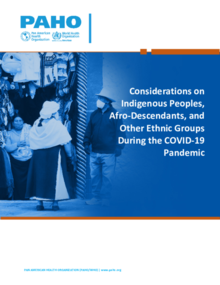In March 2020, the World Health Organization (WHO) declared that the outbreak of COVID-19, the disease caused by a new coronavirus, constituted a pandemic, given the speed and scale of its transmission. The Region of the Americas is characterized by its rich multi-ethnic and multicultural heritage. Nonetheless, indigenous peoples, Afro-descendants, and other ethnic groups are often subject to discrimination and exclusion, resulting in health inequities. COVID-19 may have a greater impact on certain populations, such as indigenous peoples and Afro-descendants.
In 2017, the Member States of the Pan American Health Organization (PAHO) approved the first Policy on Ethnicity and Health (document CSP29/7, Rev.1), which is based on recognition of the differences among ethnic groups, as well as their respective challenges, needs, and historical contexts. It also underscores the need for an intercultural approach grounded in equality and mutual respect to improve health outcomes and advance toward universal health. PAHO has prioritized ethnicity as a cross-cutting issue in emergency and disaster management. This is reflected in a series of mandates such as the Plan of Action for Disaster Risk Reduction 2016-2021 and various manuals, guidelines, and initiatives.
|

